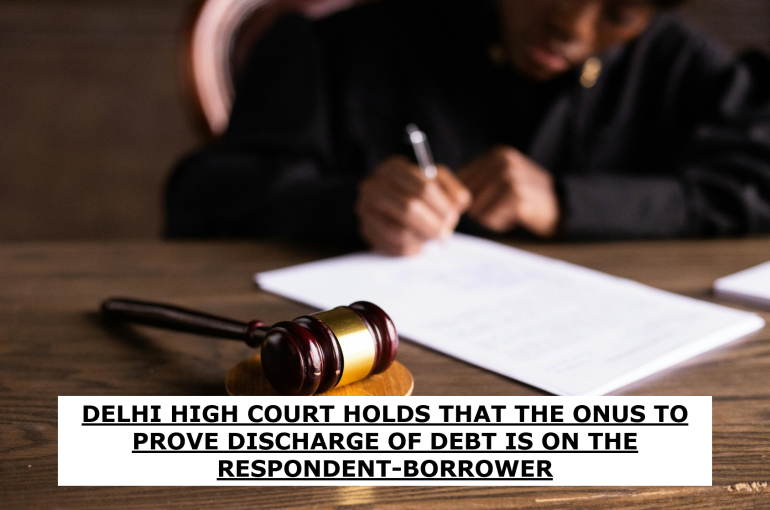DELHI HIGH COURT HOLDS THAT THE ONUS TO PROVE DISCHARGE OF DEBT IS ON THE RESPONDENT-BORROWER
A two Judge Bench of the Delhi High Court comprising Justice Vibhu Bakhru and Justice Tara Vitasta Ganju passed a judgement dated 01.07.2024 in Navigators Visa Global Logistics Ltd V. Thermoking Through Its Proprietor Pradeep Khanna RFA(COMM) 18/2023 CM APPL. 8666/2023 wherein the Bench held that it is the liability of the Respondent-Borrower to satisfy the Court that it had made successful payments to discharge its liabilities towards the Appellant, which it failed to establish.
Facts
The Appellant is a public limited Company incorporated under the Companies Act, 1956 and is involved in the business of providing logistical services and freight forwarding and on the other hand, the Respondent is engaged in the business of manufacturing and export of various electrical equipment.
The Appellant asserted that it had occasionally provided services to the Respondent and had generated invoices for those services. Nevertheless, the sum was still unpaid against the aforementioned invoices, and the Respondent neglected to make the required payment for a sum of Rs. 3,39,101/- (Rupees Three lakhs Thirty-Nine Thousand One Hundred and One only) in spite of the Appellant’s correspondence and follow-ups via several Emails. The Appellant claimed that there was no dispute to the amount payable and the Respondent had sought time to make requisite payments, but had failed and neglected to do so.
Later, the Appellant sent a Legal Notice dated 12.10.2018 to the Respondent claiming the outstanding amount. But the Appellant was unsuccessful in recovering the pending amount, and the Respondent did not reply to the Legal Notice. Thus, the Appellant filed a Commercial Suit bearing no. CS (COMM) No.9/2021 before the Ld. Commercial Court for the aforesaid amount along with interest at the rate of 18% per annum due from the date of the Legal Notice. The Respondent claimed that it had paid outstanding amounts in cash and the Appellant denied providing receipts of such payments.
The main point of contention was whether or not the Respondent actually made the monetary payments that it claimed to have done. The Respondent provided a statement of accounts that depicted that the aforementioned transactions were made in cash, whereas the Appellant’s statement of accounts did not include them.
The Respondent contended that the Appellant has not accounted for an amount of Rs. 2,40,887/- which was paid in cash as cargo expenses and an amount of Rs. 40,000/- which was paid as a security deposit. The Respondent claimed that it had paid a sum of Rs. 51,616/- in excess, which was liable to be refunded by the Appellant. The Respondent also stated that the claim raised by the Appellant was barred by limitation.
The Ld. Commercial Court in the Suit bearing no. CS (COMM) No.9/2021 passed a Decree dated 19.11.2022 and dismissed the Suit on the grounds that the Respondent had discharged its liability towards the Appellant by paying the outstanding amounts in cash and thus no further amount was payable to the Appellant. Hence, aggrieved by the decision of the Ld. Commercial Court, the Appellant filed the present Appeal in the High Court of Delhi.
Issues
i) Whether the Respondent paid the outstanding sum of money in cash to the Appellant?
ii) Whether the Appellant is entitled for recovery of Rs. 339101/- along with interest?
Decision by the High Court
The Hon’ble Bench held that the primary dispute between the Parties was that the Respondent claimed that it had paid the amount in cash, which was not reflecting in the accounts of the Appellant. However, to the contrary, the Appellant denied receiving any payment in cash as claimed by the Respondent.
The statement of a former Sales Manager, Mr. Pankaj Singh of the Appellant Company was also examined at the time of the pendency of the Suit bearing no. CS (COMM) No.9/2021 wherein he testified that the accounts of the Respondent were fully settled and there were no dues outstanding from the Respondent. To the contrary, Mr. Pankaj Singh denied the fact that he received any cash from the Respondent at the time of cross-examination. Moreover, another employee of the Appellant Company namely Mr. Gaurav Jain testified that he had sent another person for collection of cash and thus there was no sound suggestion as to who collected the cash on behalf of the Petitioner. On subsequent evaluation of evidence by the High Court, the Hon’ble Court concluded that there is no credible evidence to establish that the Respondent had made any cash payments.
The Hon’ble Bench also relied on the several Emails dated 06.07.2017 24.10.2017, sent by the Appellant calling upon the Respondent to clear the dues. However, as per the evidences produced during the pendency of the proceedings in the Ld. Commercial Court, the High Court did not find any concrete evidence which could depict that the Respondent had discharged himself from the liability.
Moreover, the Hon’ble Bench condemned the act of making payments in cash and not taking any appropriate receipt or signatures of the Appellant for the alleged payment. Thus, the onus to establish that the Respondent had made the payment in cash rested on the Respondent, which it failed to prove.
Hence, the High Court held that the Bench was unable to accept that the Respondent had successfully discharged its debt against the Appellant and thus, the Respondent would be liable to pay the outstanding amount to the Appellant.
Conclusion
The High Court of Delhi set aside the impugned judgement dated 19.11.2022 passed by the Ld. Commercial Court in CS (COMM) No.9/2021 and allowed the Appeal filed by the Appellant. The Hon’ble Court not only ordered for the recovery of the principal amount but also directed the Respondent to pay 12% interest from the date of institution of Suit till its realization, to the Appellant.
ARJAV JAIN
ASSOCIATE
THE INDIAN LAWYER & ALLIED SERVICES





































Leave a Reply